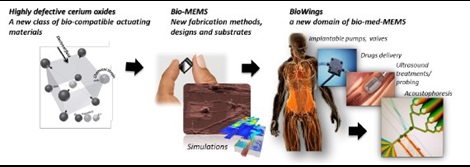
Demographic trends, such as the rapid growth and ageing of the world population, are putting pressure on global healthcare systems, increasing the demand for smart, effective and affordable biomedical systems. Micro-Electro-Mechanical Systems (MEMS) are key components of such biomedical systems, enabling miniaturised devices with diagnostic, prognostic and therapeutic functionalities. Although these systems are poised to revolutionize medical diagnostics and treatment approaches, the slow progress in the development of biocompatible actuator materials is still hindering this industry, preventing a host of new biomedical devices to enter the mainstream market.
BioWings proposes to solve this deadlock through the implementation of a completely new class of smart actuating materials to be integrated in biocompatible MEMS. This family of materials is based on highly defective cerium oxides, which recently displayed radically different properties compared to existing ones:
- They are non-toxic and environmentally friendly, unlike the current lead-based actuators;
- They show exceptionally high and still uncapped electrostrictive response under moderate electric fields, enabling low power consumption devices;
- They are fully compatible with silicon-based technologies and many other substrates, including metals and polymers.
To fully explore the potential of these materials, foundational knowledge must still be generated on both the basic physical mechanisms and the manufacturing process. To reach this, BioWings focuses on:
- Understanding, predicting, and controlling the mechanism underlying the unparalleled electrostrictive behaviour of highly defective oxides, by unveiling the effects of the microstructure, as well as the type and concentration of dopants;
- Identifying a methodology for controlling the electromechanical properties of such materials, using facile manufacturing processes on environmentally friendly biocompatible substrates and electrodes, exploring.
This project has received fundings from H2020-FETOPEN (FET-Open – Novel ideas for radically new technologies) and will be running from 01-06-2019 to 31-12-2022